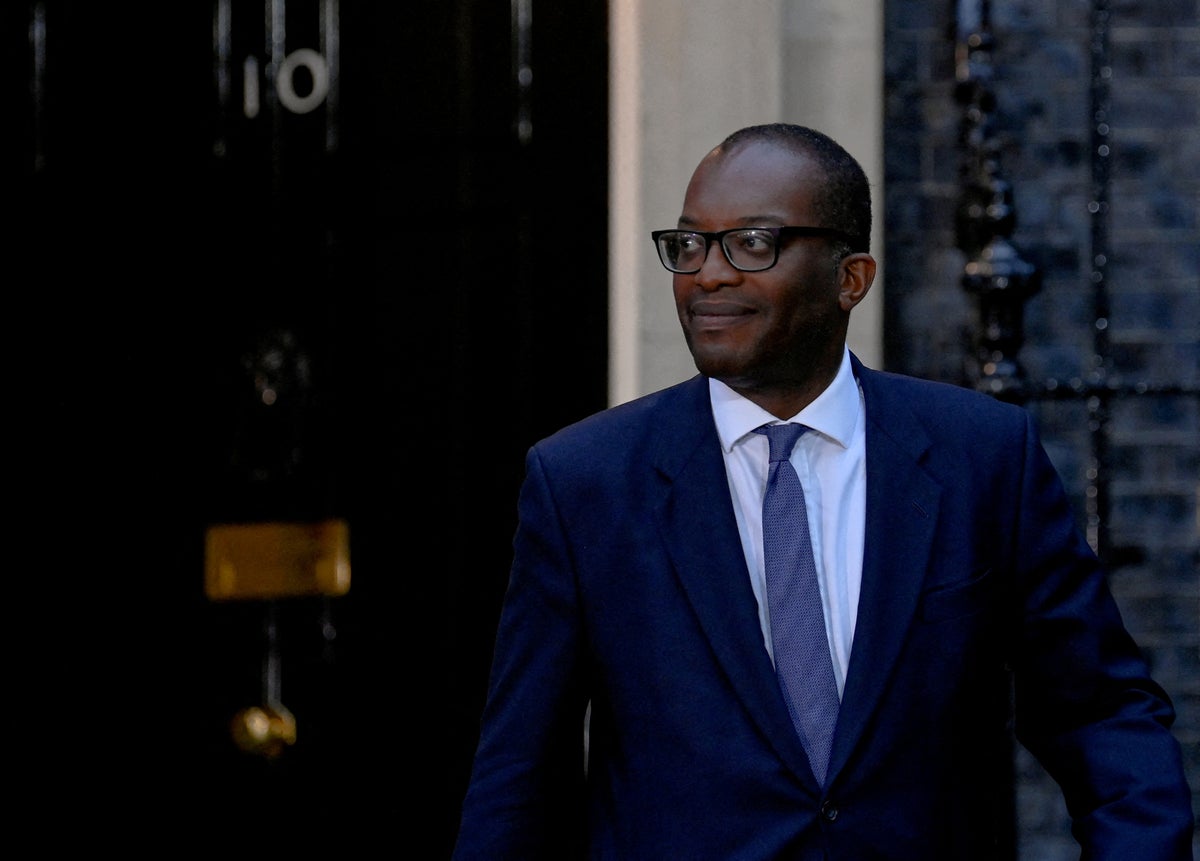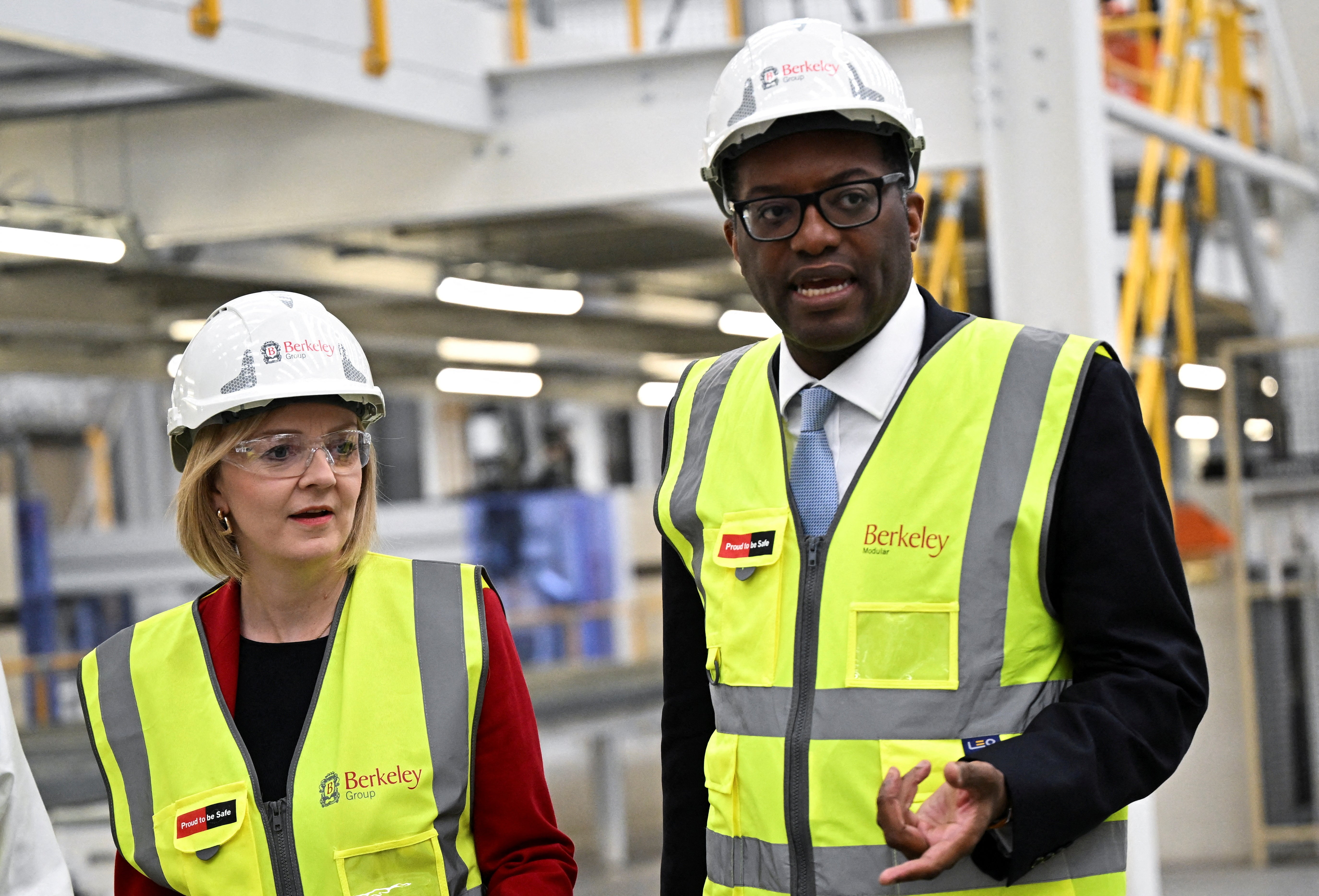
Kwasi Kwarteng has vowed to push on with the government’s radical borrowing-fuelled tax cut spree despite growing calls to “reverse course” amid ongoing market turmoil.
The chancellor promised to produce “credible plan” to reduce government debt on 23 November – but insisted that he and Liz Truss would be pushing on in their search for growth.
“We are confident in our long-term strategy to drive economic growth through tax cuts and supply-side reform,” the chancellor said at a meeting with banking and investment chiefs on Tuesday.
“I’m confident that with our growth plan and the upcoming medium-term fiscal plan – with close co-operation with the Bank – our approach will work,” Mr Kwarteng added.
It comes as Virgin Atlantic chief executive Shai Weiss called on Ms Truss and Mr Kwarteng to “reverse course” to halt the perception of “unsustainable perceived weakness in international markets”.
The airline boss added: “Sometimes all of us in this room should be humble enough to say, ‘If I did something that is not working, maybe I should reverse course.’ That is not a bad thing to do.”
JP Morgan economist Allan Monks told Reuters that Mr Kwarteng would have to “reverse or reconsider” their strategy to stop things getting worse.
“There is still no clear sign that the source of the problem – the government’s fiscal strategy – is being reversed or reconsidered. This will need to happen before November in order to avoid a much worse outcome for the economy.”
Former US Treasury chief Larry Summers said on Tuesday that the markets were treating Britain like a developing country where “credibility” is lost after Friday’s borrowing-fuelled tax cut plan.
And Germany’s finance minister Christian Lindner questioned the “experimental” economic plan. “In the UK, a major experiment is starting as the state simultaneously puts its foot on the gas while the central bank steps on the brakes,” he told an event on Monday night, according to Bloomberg.
Mr Kwarteng met with banking and investment chiefs – including Aviva, Legal and General, Royal London, BlackRock, Fidelity, and JP Morgan – to discuss deregulation plans on Tuesday morning.
According to a read-out of the meeting, the chancellor told them that cabinet ministers “will set out more supply-side measures over coming weeks”, and said “every department will be a growth department”.
Tory MPs have shared their outrage over the mini-Budget, with one backbencher telling The Independent that the tax-cutting package “strange and stupid”, while a second lashed out at “Tea Party Republicans running the show”.
One senior backbencher said recent days had “substantially reduced” the party’s general election chances, but remained gloomy about any change in course, or the idea that Ms Truss could be replaced. “What’s the f****** point?” they said.
Mel Stride, Tory chairman of the Treasury select committee, said on Tuesday the chancellor’s mini-Budget and market fall-out had “put it in jeopardy without question” the party’s economic reputation.
He told BBC Radio 4’s World At One programme that “unfunded tax cuts of the kind of order that we’re looking at here“ had “spooked the markets, because those tax cuts have got to be paid for”.
Mr Stride said the “higher costs of borrowing for government” was more worrying that the recent fall of the pound.

The pound steadied at about 1.08 on Tuesday afternoon, recovering slightly from the record low against the US dollar the previous day.
But government borrowing costs continued to climb on Tuesday, as investors continued to dump UK bonds. The interest rates on 30-year gilts – which move in the opposite direction to the price of the bonds – rose above 4.6 per cent, the highest level since the 2008 banking crash.
Sir Charlie Bean, the Bank of England’s warned on the Today programme: “It now costs the UK government more to borrow than Italy or Greece, who we have traditionally thought of as being ... not quite basket cases, but certainly weaker-performing sovereign entities.”
The Bank of England’s chief economist Huw Pill repeated the willingness to hike interest rates further – admitting there would be “challenging times” ahead to bring inflation back down to a target of 2 per cent.
“I think it’s hard not to draw the conclusion that all this will require a significant monetary policy response. Let me leave it there,” he told the International Monetary Policy Forum on Tuesday.
Ms Truss is said have needed convincing about the issuing of government statement on Monday – which included the promise OBR forecast and “medium-term” fiscal plan on 23 November.
The prime minister and chancellor initially took different positions on the need for a statement, according to Sky News, before agreeding on an attempt to reassure markets with the promise of economic forecasts next month.
Sir Keir Starmer said the Tories had a “lost control of the economy” in his Labour conference speech in Liverpool on Tuesday.
“If you lose control of the economy, if you act irresponsibly – as the Tories have done in spectacular fashion – then you lose the ability to do anything. And working people pay the price. We will not let that happen,” he vowed.







